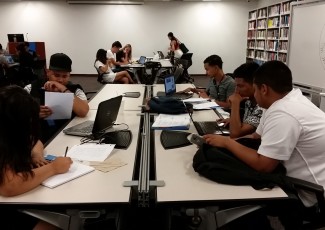Personal Connections Help First-Gen Students
By Emily Rogan
March 15, 2016
Ideas from an organization that supports students every step of the way.
A national survey by Royall & Company, a division of the Education Advisory Board, found that of more than 8,500 college-bound students, more than half of minority, first-generation and low-income students found personal letters and text messages helpful when choosing a college, compared with other college-bound high school students.
It’s no surprise, then, that an organization that enlists individualized interpersonal attention to support that same demographic from high school through college completion is realizing huge results. Bottom Line, founded in 1997, has a completion rate of 83 percent, according to CEO Virgil Jones.
To help students as they transition from high school to college and as they persist through college, “we implement and execute a one-to-one, high-touch coaching model,” Jones says. Bottom Line provides its services free of charge to students, relying on fundraising and donations to support their services. The company partners with colleges in Massachusetts, New York and Chicago, and it plans to expand to other states.
Making those personal connections
The Access program pairs Bottom Line counselors with high school students to discuss their goals and aspirations and help the students navigate the overwhelming process of applying to college. Often, these students don’t have family members with knowledge or experience to share, so the counselors fill that role.
The Success program provides up to six years of advising and mentoring to students once they’ve matriculated, ensuring that they have help dealing with the financial, personal, academic and career challenges that arise during the college years.
Bottom Line’s counselors “teach students how to be resilient and how to adjust to campus,” Jones says. “They’re not psychologists or therapists but counselors who are there to help them get to resources, because the students don’t know how,” he says. “And as the students persist year after year, their counselors continue to follow them and support them where it makes the most sense.”
Bottom Line wraps its philosophy around DEAL: degree, employability, aid and life, offering students comprehensive support, including phone calls, texts, on-campus visits and even care packages, right until the students graduate.
What works best
Here are a few strategies Jones recommends to help support students through completion:
- Establish a mandatory summer transition program for new students. A weeklong intensive bridge program will help them acclimate to college life, so they’ll have some level of comfort and familiarity when school begins.
- Provide the most support in the first year and front-load it in the first semester. Learning time-management and study skills helps students become resilient and exude courage and confidence.
- Make it simple for students to get support when they’re having academic difficulties. Whether they need labs or a tutor, students should be able to easily find and make use of the support services.
- Get them involved in on-campus activities. “If you like where you are and are engaged, you will do better,” Jones says.
- Assume that first-generation students are capable, talented and have a high level of potential. Jones points out that these students don’t lack ability — just the foundation and resources their peers have.
Is it replicable?
Bottom Line’s partner colleges, called target colleges, are primarily four-year institutions, though there are several community colleges as well. Regardless, Jones believes his model is replicable and can be successful at any school.
“There must be fidelity to whatever you decide to do,” Jones says. “Programmatically, you have to invest in staff and put together programs to counsel and coach students along the way,” he says. “You must invest additional resources when you can to have the most robust program and make a commitment to do it year to year and not just for a short period of time. You must ensure excellence.”








